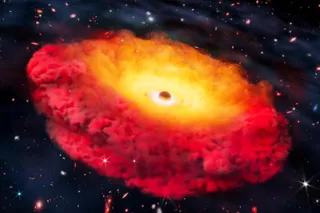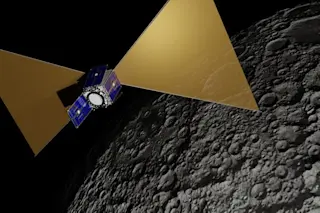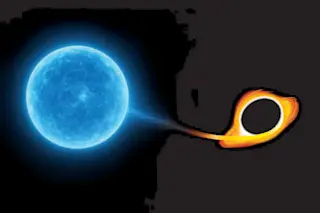While many sci-fi writers have wondered if time travel into the past can be allowed as long as you slip into an alternate universe, you should be warned: Nature doesn’t like a cheater.
Time travel into the past is a real pain in the neck. For one, as far as we can tell it’s forbidden in our universe. You can travel into the future as slowly or as quickly as you like, but you can’t stop time or go in reverse.
Is It Possible To Travel Back in Time?
Technically speaking, physicists are not exactly sure why time travel is forbidden. We don’t have a single law of physics that clearly rejects the possibility.
But every time we try to concoct a time travel concept — like wormholes or twisting paths around infinitely long cylinders — we find some reason that it’s not allowed. Wormholes, it turns out, require negative mass to stabilize themselves, and infinitely long cylinders are rather hard to come by.
Read More: Why Do Humans Perceive Time The Way We Do?
The Trouble With Changing the Past
Even within any glimmer of a possibility that time travel might be possible, traveling into our own pasts opens up all sorts of noxious paradoxes, as plenty of films and comic book storylines have demonstrated.
Beyond the fact that the past is over and done with, we must reckon with the reality that what happened in the past created the present that we experience.
To put the paradox succinctly: If you change the past, you change the present, but the present already exists.
The Grandfather Paradox
One of the most common examples of this head-scratching scenario is known as the grandfather paradox.
Suppose you travel back in time and kill your own grandfather before he met your grandmother (no need to dissect your motivations behind this hypothetical act here). That means one of your parents was never born, which means you never exist. But if you never existed, how did you go back in time to kill your grandfather in the first place?
Read More: What Is the Grandfather Paradox of Time Travel?
Are There Multiple Universes?
To address this dilemma, we could invoke the idea of parallel or alternate universes, a concept under the general umbrella of the multiverse.
Perhaps when you go back and kill your grandfather, you create a new universe where you don’t exist. You can then return to your original universe where everything is hunky-dory (or, at least you’re still alive). Essentially, you only monkeyed around with some other, disconnected cosmos.
There are, in fact, two places in physics where the multiverse concept pops up. Unfortunately for any wannabe time travelers, neither of them allows for this type of parallel-futures hopping.
Splitting-Off Worlds in Quantum Mechanics
The first place where alternate universe theories have gained traction is in quantum mechanics.
Subatomic processes are inherently random. When we run an experiment we never know what result we’re going to get. One explanation for this is that all experimental results happen, just in separate universes.
If someone shoves an electron through a strong magnetic field, for example, and it has a fifty-fifty chance of deflecting either up or down, then every time they run an electron through the device, they get two universes: one where the electron went up, and one where the electron went down.
As the theory goes, this kind of splitting isn’t just limited to arcane physics experiments. It happens with every single quantum interaction throughout the cosmos, which is a lot of interactions, thus generating countless parallel worlds.
In this view, there is a universe out there that already exists where your grandfather is dead and you were never born. But you could never see it.
Read More: Advanced Quantum Material Curves the Fabric of Space
No Travel Between Worlds in Quantum Mechanics
Even if the theory above is actually happening, the rules of quantum physics are absolutely clear: There is no travel or communication between these universes.
Granted, “universe” is probably the wrong word here. That’s because the splitting is really separate partitions of a single quantum wave function. And that separation is really permanent.
If there was any kind of connection allowed, then the many branching possibilities of quantum processes simply wouldn’t happen.
Bubble Universe Theory
The second place where the multiverse pops up in physics is in studies related to the extremely early universe.
From this lens, our cosmos could be just one of many — like a bubble in an infinite foam of universes. These universes too could contain all the many interesting and varied possibilities that make life so fun.
In this (extremely hypothetical) view, there are many universes out there that contain alternate realities from the one you know. There’s one where your grandfather died. There’s another where no stars ever formed. And there’s a universe where all your matter is replaced with antimatter, and so on.
Because all these bubble universes exist in the same expanding foam that is reality, those alternate universes really are out there, an unimaginable but still-finite distance away.
Time Still Marches Forward in the Multiverse
But even in this foam-like collection of bubble universes, time still does its thing. That is, it moves forward, always.
Even if you could concoct some scheme to travel among the alternate universes, those universes still share the same spacetime fabric, marching forward along with us. Thus they all appear to forbid time travel, as the theory goes.
They also, in theory, share the reality that nature doesn’t like a cheater. So, if you’re theoretically going to visit a universe where you never existed, maybe nix the time travel method.
Read More: Scientists Attempt to Map the Multiverse















